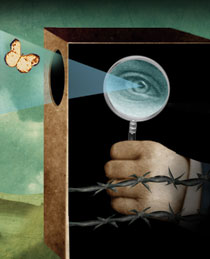Being Jewish
Commentary
Commentary: Questions of Faith

I was 12 when I stopped believing in God. I lost my faith when I first encountered the horrific images of the Holocaust in the film Night and Fog.
Over the years, I began to understand that faith was bigger than my rejection; it was about the origins of everything and the bottomless resilience of the human soul. I discovered that many had found the faith to believe—at times even in the concentration camps—despite moments of terror and pain.
Years later a passage in the literature of the Holocaust brought these themes back to me. Perhaps the most terrifying moment in all the memoirs of the Shoah is in Primo Levi’s masterpiece, Survival in Auschwitz.
Recounting his time in the camp, Levi recalls that while suffering from thirst he broke off an icicle outside a barracks window. When a guard snatched it from him, Levi asked “Warum?” (Why?) The guard responded “Hier ist kein warum” (Here there is no why). The greatest terror is if the universe presents a blank face; if, as in the camp, there is no why.
If there is no God, there is no why. Faith believes in the legitimacy of asking “why”—that the very question is an animating force in life.
A year ago, after reading yet another editorial about the evils of religion, I tossed the paper down in fury. Today, I have completed a book in defense of faith. The day I turned in the final pages, I said to my wife, “You know, it all began the day I read that editorial.” She looked at me sweetly and said, “No, David, it all began the day you were diagnosed with lymphoma. Three months after you finished chemotherapy, you began writing it.”
She was right. Although part of Why Faith Matters (HarperOne) is about religion and violence, and part about religion and science, I have also written about my struggle with my own and my wife’s cancer. It is about faith in dark times, and the way faith touches not only society but also the individual and the family.
Nine months after our daughter— our only child—was born, my wife was diagnosed with cancer that led to surgery and an inability to bear anymore children. A few years later, while speaking at the opening of the Hillel at the University of Pennsylvania in Philadelphia, I had a grand mal seizure and was diagnosed with a brain tumor. Three years after that, I was in treatment for lymphoma.
Those were the experiences, alongside the sufferings and kindnesses I witness daily as a rabbi, that shaped my understanding of faith. I feel angry at people who deride religion without understanding that faith lives less in grand, world-shattering declarations than in quiet kindness and the warmth of community; in the meals we bring to the shiva house; in the talit we drape over the couple standing beneath the huppa; in shared joys and in the compassion with which we watch over one another in sorrowful moments. To know God is not only to ask great questions of evil and good but also to feel the everyday wonder and pathos of God’s world.
More than once I have stood at the bedside of congregants who are dying. They want to know why. The difference between the world as I know it and the world Primo Levi portrays is not that I can answer why, but that I can answer there is a why. God is not the automatic answer to all questions but the assurance of meaning in our lives. Is the world spinning in a void, or do we matter?
Faith has a good deal to answer for, but if we study history carefully and look at science with a discerning eye, we discover that true faith enriches both our minds and our souls. Religious traditions orient us in the world, tie us to one another and lift our souls to God.
Does faith matter? I try my best to answer that it does—to our lives and to our world.










 Facebook
Facebook Instagram
Instagram Twitter
Twitter
Leave a Reply